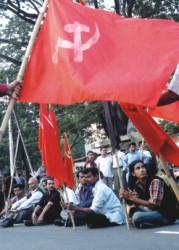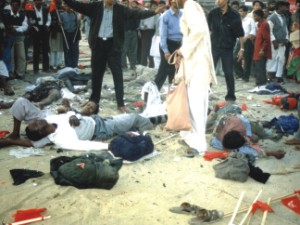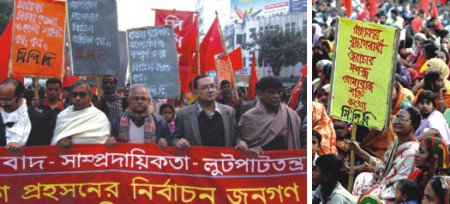|
Politics
Keeping the Red Flag Flying
Last week the Communist Party of Bangladesh celebrated its 60th birthday
Ahmede Hussain
 |
Photo: AFP |
The birth of the Communist Party of Bangladesh (CPB) can be traced back to the Second Congress of the Communist International in 1920, when the Communist Party of India was formed in Tashkent. The CPI played a decisive role in the anti-imperialist movements leading up to the independence of India and Pakistan. After the separation of the sub-continent, on March 6, 1948, at the 2nd Congress of the CPI, it was decided that the comrades on the other side of the fence should form their own party; Communist Party of Pakistan (CPP) was formed, electing Comrade Sajjad Zahir as general secretary. Twenty years after that the 4th congress of the provisional committee of the CPP declared itself to be the first congress of the Communist Party of East Pakistan (EPCP). The CPB, in its five-decade long existence, has faced periodic obstacles, and the first one came when it was in infancy. From 12000, the membership of the party in East Pakistan, immediately after the partition, came down to a few hundreds as most of the party members left the country to live in India. “Because of this,” says Mujahidul Islam Selim, secretary general of the CPB, “the party grew strong in India, whereas the movement here suffered.”
The biggest challenge, however, was yet to come, during most of the Pakistani era, the communist party was banned. Working underground turned out to be a tricky business, especially at a time when the mudslinging between the Soviet and Chinese parties led to the break up of the communist party in East Pakistan. The faction that followed (at times blindly) the Soviet Party, later, during the Liberation War played a pro-people role, while the other main faction (EPCML) declared their allegiance towards the Chinese party, even though the 'mother party' cared very little for her forlorn and lost comrades in Bangladesh. The Chinese government actively opposed the Muktijuddo: the EPCML compared Bangladesh's war of liberation as a squabble between two dogs. Some of these groups, after the country's independence, in fact, led a dog's life-- these splinter factions later kept breaking up, sometimes for ideological reasons, in most of the cases for the petit-bourgeoisies reason of grabbing party-power. The armed conflict between these scatter-brained thugs wreaked havoc in the northeastern and western districts of the country in the mid eighties and early nineties. Some remnants of these infantile leftists are still marauding in some small pockets of Bangladesh.
 |
The perpetrators of January 20 attacks on the CPB meeting are yet to be punished. Photo: Star |
The CPB, on the other hand, at the beginning of the liberation formed a special force with Bangladesh Students Union and National Awami Party; its members fought valiantly against the Pakistani occupation forces and their collaborators Al-Badr, Razakar, Al-Shams. During the rule of Bangabandhu Sheikh Mujibur Rahman, the party worked actively with the Awami League, because of which, throughout the seventies and eighties many called the party the AL's lapdog. Mujahidul Islam Selim admits mistakes, “Bangabandhu's progressive policies like nationalisation and non-aligned foreign policy we rightly supported; but we did not criticise his weaknesses and mistakes, say things like his backing off from land reform, his giving himself up to imperialism, his party's mismanagement and corruption.”
After the brutal assassination of Bangabandhu, the party, at the beginning of Ziaur Rahman's rule, was banned, which was later lifted. Zia's rule and the first half of Ershad's witnessed a resurgent growth of the CPB; Khentmojur Samiti, its farm-workers' wing boasted hundreds and thousands of members, in the general elections that followed after the fall of Ershad's demonic rule the CPB won five seats, establishing itself as the fifth largest political force in the country. But, as happens in the history of the party, in the early eighties the CPB faced a break-up from within; “It was indeed a big crisis,” Selim says, “All the problems or break-ups that the party had faced before was over differences of opinions on materialising socialism, our ultimate goal, but in this case a significant number of party central committee members wanted to liquidate the CPB saying that communism was no longer relevant to the post-Soviet world.” Of those who left the party at that time, some went to Gono Forum; its MPs joined either the BNP or the AL. The party, in the last ten years, regularly faced terrorist attacks; the severest one took place in 2001, in which four people died when bombs went off in near simultaneous blasts at a party rally in the capital.
 |
| The CPB has placed its own demands for a free election. Photo: Star |
Selim thinks, as an ideology communism remains relevant. “In Bangladesh, all around us we have communist dominated countries,” he says, “There are ups and downs in history. Our politics is infested with criminalisation and muscle and money power, in such a situation, even if we hold ground it's an achievement.”
Copyright
(R) thedailystar.net 2008
|
|
